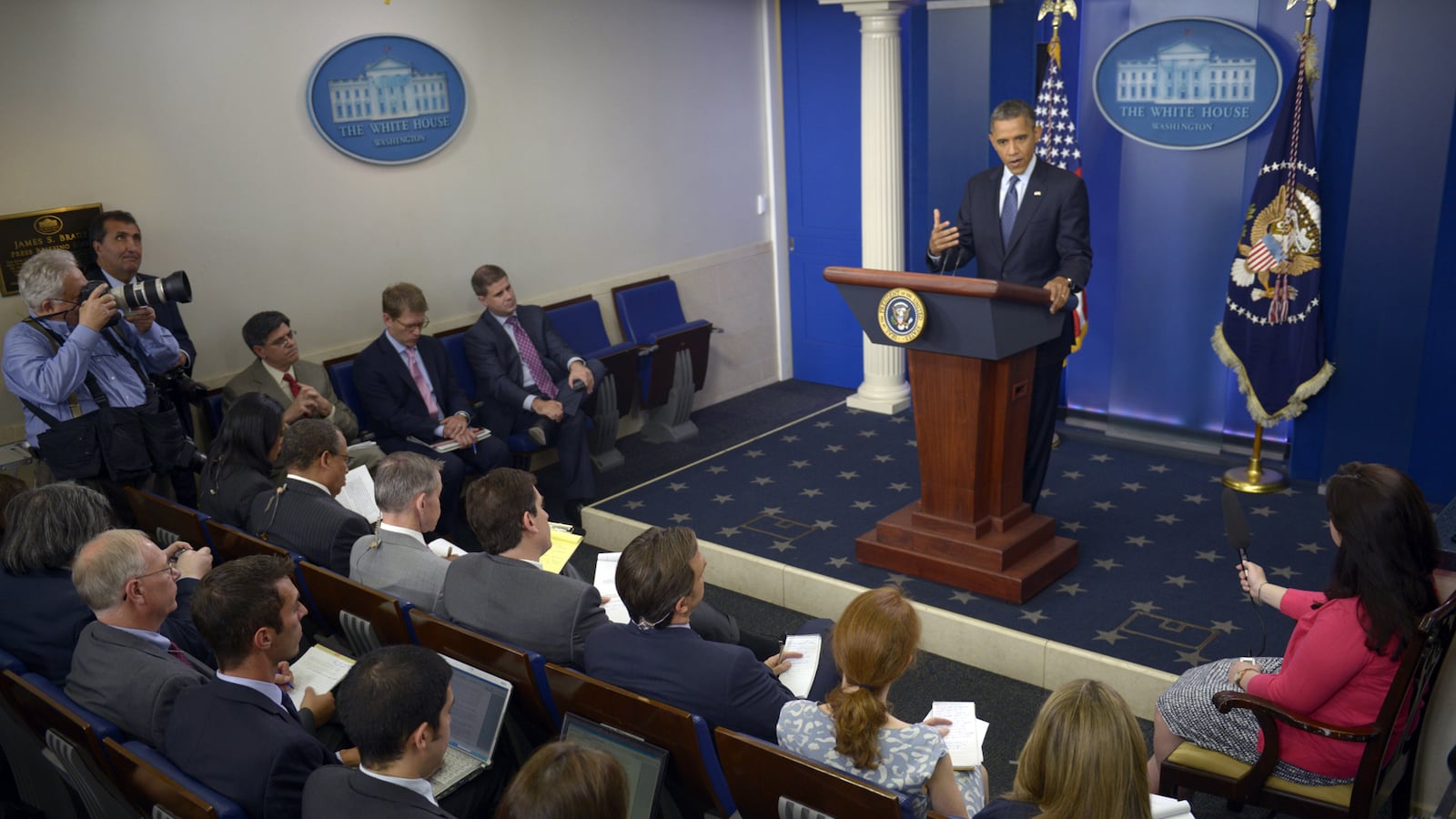After a week of mounting criticism that the Obama White House leaked classified information about the president’s secret programs to fight terror overseas, President Obama denied he or his government surrogates planted the information, and angrily denied critiques that the leaks may have been for political gain.
“The notion that my White House would purposely release classified national security information is offensive,” he told reporters in the White House briefing room. “It’s wrong, and people I think need to have a better sense of how I approach this office and how people around here approach this office.”
At issue have been two major articles written by The New York Times about Obama’s secret drone program and a classified cyber warfare program to undermine Iran’s nuclear development program. A new book by Newsweek and The Daily Beast’s Daniel Klaidman, Kill or Capture, also included classified revelations about the drone program as well as information about closed-door White House meetings that the president participated in.
Both Times stories described Obama’s evolution over using secret warfare that, in some cases, caused casualties among innocent civilians in places like Afghanistan and Iraq. The story described how the administration kept track of high-value targets using a set of baseball cards, and that Obama had personally overseen the program to ensure the U.S. was winning the fight against terror. The implication was that Obama had toughened from his 2008 campaign stance of negotiation and reconciliation in order to more effectively and covertly get rid of America’s enemies.
Three days later, the second Times article described a broad computer virus designed by U.S. and Israeli officials to ascertain information secretly from Iran’s nuclear scientists. The program had been in operation for over two years; the articled reported that Obama, even when part of the program became public last year, pushed for the cyber surveillance to continue.
Some on Capitol Hill have suspected the information came from the White House to portray Obama has a strong and merciless leader in the war on terror. Sen. John McCain on Tuesday accused the White House of selective leaking to bolster Obama’s reelection chances. Sen. Lindsey Graham and Rep. Peter King, also both Republicans, echoed the charges.
Even some Democrats, including Dianne Feinstein, decried the constant leaks, saying they “had to stop.” Sen. Bob Casey also called the leaks “very serious.” But Feinstein said she was skeptical the information "came directly out of the top ranks of the White House."

Dean Baquet, the managing editor of The New York Times, defended his reporters who broke the story and denied the information was attained through leaks. “I can’t believe anybody who says these are leaks,” Baquet told Politico this week. “Read those stories. They are so clearly the product of tons and tons of reporting.”
The three reporters who worked on the Times stories have denied the information was spoon fed to them from the White House. The “kill list” story discloses that some information was gleaned from interviews with three dozen current and former administration officials. But the fact that the administration has not raised any objections about the content or existence of the stories, including the parts that included classified information, has fueled speculation on the Hill that to suspect the White House was the primary source.
Several thousand people in Washington with security clearances have access to such classified information. But most suspicious in the episode is that much, if not all, of the information in the Times and Newsweek stories appears favorable to the White House. During an election season centering on an uninspiring economy, the Obama administration has touted its strong record on foreign policy, a record in the past the president has very much wanted to discuss with reporters.
Obama made the statements while playing another round of offense against Republicans. In the same set of comments Friday morning, he echoed his earlier economic talking points that urged House Republicans to pass bills on transportation and student loans. Paralysis on Capitol Hill this year makes it highly unlikely that any of his ideas would be passed by agreement in both houses.
But considering election years are very much about messaging, maintaining hold of the narrative – and the cameras’ focus – is the principal aim of the president. Toward that goal, He traveled this week in California and Nevada with a similar message, urging Congress to pass his “to-do” list, as well as raise money for his campaign. Playing hardball, House Speaker John Boehner called his own press conference shortly after Obama wrapped up.





